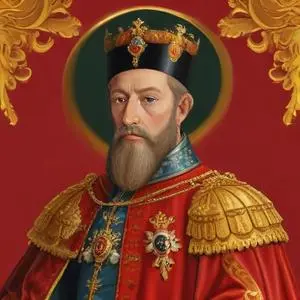
First Holy Roman Emperor to rule simultaneously as King of the Romans and King of Spain, known for uniting fragmented German states and establishing the Habsburg dynasty.
Maximilian I, Holy Roman Emperor, is renowned for being the first emperor in 250 years to rule as well as reign, earning him the nickname "Coeur d'acier" or "Heart of Steel". He was a powerful warlord and shrewd politician who expanded the influence of the House of Habsburg through strategic marriages and military conquests.
Born on March 22, 1459, Maximilian was the only surviving son of Frederick III, Holy Roman Emperor, and Eleanor of Portugal. He was crowned King of the Romans in 1486 and ran a dual government with his father until Frederick's death in 1493. After his father's death, Maximilian proclaimed himself elected emperor in 1508, breaking the tradition of requiring a papal coronation for the adoption of the Imperial title.
Maximilian's marriage to Mary of Burgundy in 1477 secured his claim to the Burgundian State, while his son Philip's marriage to Joanna of Castile in 1496 established the Habsburg dynasty in Spain. These strategic alliances allowed his grandson Charles to hold the thrones of both Castile and Aragon.
Maximilian was an able military leader, earning him the admiration of his contemporaries. He waged several successful campaigns, including the War of the Burgundian Succession and the Italian War of 1494-1498. Although he lost his family's original lands in modern-day Switzerland to the Swiss Confederacy, he expanded the Habsburg influence through his military conquests.
Maximilian's reign marked the beginning of the Habsburg dynasty's rise to prominence in Europe. He was known for his courage and soldierly qualities, earning him the nickname "der letzte Ritter" or "the last knight". His grandson Charles V, who inherited his throne, would go on to become one of the most powerful rulers in European history.
Maximilian was a patron of the arts and sciences, supporting humanist scholars and artists. He was particularly interested in the works of ancient Greeks and Romans, and his court attracted prominent scholars and intellectuals of the time.
Maximilian's legacy extends beyond his military conquests and political alliances. He encouraged the development of printing, which helped spread knowledge and ideas throughout Europe. His patronage of the arts and sciences contributed to the Renaissance humanist movement.
"I am the last knight" is a quote often attributed to Maximilian, reflecting his chivalrous values and his perception of himself as a defender of Christendom.
Maximilian's reign occurred during a time of great upheaval in Europe, marked by the rise of nation-states and the decline of the feudal system. His legacy as a powerful warlord and shrewd politician has endured, earning him a place in history as one of the most influential figures of the Renaissance.
Maximilian's contemporaries, such as Pope Julius II and King Ferdinand II of Aragon, recognized his military prowess and strategic thinking. His ability to forge alliances and expand his influence through marriage and conquest set him apart from other rulers of his time.

Born in 1643
A 17th-century nobleman who ruled Lorraine and played a significant role in the Thirty Years' War, known for his military campaigns and territorial expansions.
Born in 1438
Ruler of Savoy from 1496 to 1497, known for his brief but tumultuous reign marked by conflicts with neighboring states and internal power struggles.
Born in 1552
The eccentric and reclusive ruler of the Holy Roman Empire, known for his fascination with alchemy, astrology, and the occult, and his patronage of artists and intellectuals.
Born in 1777
King of the Two Sicilies from 1825 to 1830, known for his attempts to reform the government and economy, but ultimately failing to modernize the kingdom.